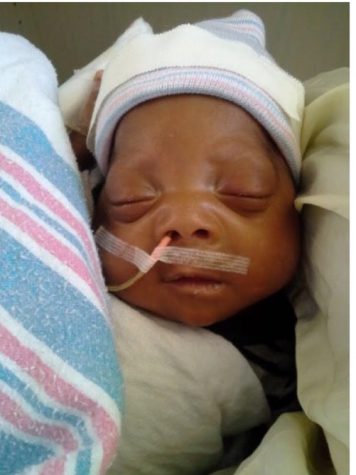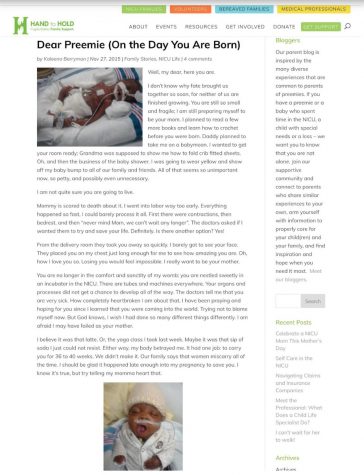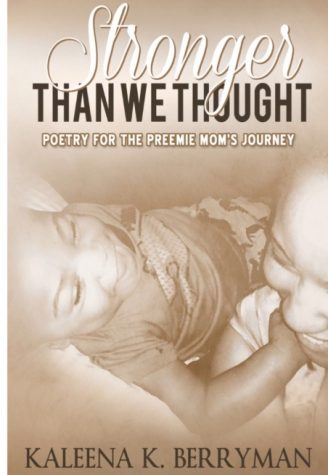I Did Everything Right (Mistake Version)
Jharid in the NICU after being born 16 weeks early. He was hooked up to machines that were assisting him in staying alive.
April 17, 2018
There she laid, nervous and unsure of the events that were to follow. The bland beige colors of the hard brick walls taunted her, the infamous ‘hospital smell’ of disinfectant invading her nostrils. This wasn’t the plan, she still had 16 weeks left to go. Maybe she could just spend the rest of the time in bedrest? Perhaps he’d wait?
Nope, he was already in position. The doctors came rushing in, instructing her to lie on her side, elevate her legs and relax. The sturdy bed adorned with white cotton sheets swayed as she did. The small TV chirped in the background, the sounds of the heart monitor and other machines creating a small symphony. In the foreground was a woman, her fiancé, and a small, fragile baby.
A preterm baby is considered to be born before the standard 37 weeks of pregnancy are completed. According to the Center for Disease Control and Prevention, preterm birth affects about 1 of every 10 infants born in the United States. About 15 million babies are born too early every year, and the rate of preterm birth among Black women is 14 percent. There is no known reason for why black women have a higher preterm birth rate.
Berryman had never smoked. She never took drugs. She stays active and eats a balanced diet. She didn’t consume alcohol during her pregnancy. She wasn’t overworked. She avoided ginger ale and caffeine, despite the coffee withdrawal. She did prenatal care and took vitamins.
There weren’t any signs that Jharid was going to be premature. Berryman went to all of her OB appointments, and her doctor never warned her that she might not carry full term. She had a high risk pregnancy because of a pre-existing thyroid condition, but the doctor never saw it posing a threat to Jharid.
16 Weeks Early
“On Monday I was having pain, and on Wednesday it got really bad so I went to the hospital. By Friday he was born,” Berryman said.
Once she got to the hospital, things started moving quickly. She was having contractions, and the doctors tried to figure out what was going on.
When they had their diagnosis, they gave Berryman a preposition.
“The doctors asked if I wanted them to try and save his life. I was like ‘definitely, is there another option? Yes!’ she said.
Jharid was born weighing one pound and five ounces, and was very fragile. He had to be taken to the NICU immediately after his birth.
Kaleena’s sister, Kandi Berryman was shocked to hear that Jharid was born early.
“Finding out Kaleena went into labor as early as she did and seeing Jharid for the first time was heartbreaking. I didn’t really know what to expect. He was so tiny with so many bandages and hooked up to all different sorts of wires. It was nerve wreaking. But very soon after I started to feel faithful and excited for his growth. He was tiny but so handsome and such a little trooper. I honestly was more concerned about Kaleena’s well-being than Jharid’s. It hurt me a lot to know she was so sad. But I knew Jharid would be ok,” she said.
Prematurity
Berryman ended up finding out later on that Jharid came early because her placenta got infected, and essentially kicked him out of the womb.
There are three subcategories regarding preterm birth, based on gestational age. Extremely preterm infants are born at less than 28 weeks, very preterm infants are born at 28 to 32 weeks, and moderately late infants are born at 32 to 37 weeks.
Jharid was born at 24 weeks gestation on Friday, April 27, 2012.
The glass. The clear barrier that never failed to remind her that something was wrong. The wall that kept her out and trapped him in. He was no longer in the comfort and sanctity of the womb but nestled sweetly in an incubator. There are tubes and machines everywhere. In fact, the small space the room occupied was full of machines, all of which were attached to him. The machines kept his underdeveloped organs going. Minutes, hours, days pass and his frail body is still blocked by the glass. This room became a second home. Always going back and forth, tests, checkups, surgery.
Due to him being born so early, he was extremely underdeveloped. All of his vital organs couldn’t work on their own, and the machines in the NICU kept him alive.
“They didn’t even anticipate that Jharid was gonna live, the doctor told me if he lived it would be a miracle,” Berryman said.
Jharid spent five months in the NICU, battling grade three brain bleeds, retinopathy of prematurity, chronic lung disease, a patent ductus arteriosus (PDA), and necrotizing enterocolitis. Most babies only have one or two premature health issues, but Jharid had all of them, which is rare.
Scariest Hospital Visit
Necrotizing Enterocolitis (NEC) is a serious intestinal disease that usually affects babies born before 32 weeks of gestation. According to KidsHealth.org, NEC is typically caused by an underdeveloped intestine, or too little oxygen or blood flow to the intestine at birth (usually the result of a difficult delivery). NEC happens when death or injury occurs in the small or large intestine. This inflames the intestine, and may cause a hole in rare cases. This allows waste to pass through the intestine and enter the baby’s bloodstream, which makes the baby very sick and brings infection.
NEC brought on one of the most scary visits in Jharid’s hospital career.
In one of her blog posts, she writes “I went to the store and my cell phone rang – and my heart stopped. It was the hospital telling me to come quickly, something was wrong with my son. I ran out of the store, hopped into a cab and flew into Jersey City Medical Center. His dad was already there waiting,” she said. “Jharid’s belly had turned bluish-gray, and he was having even more difficulty breathing. My greatest fear was coming true. I remember thinking; ‘he is going to die right before our eyes.’ He looked so pathetic, so weak and so sick.”
The worst part was that the doctors didn’t know what was wrong with him.
Jharid had to change hospitals, and was taken to the St. Josephs hospital in New York. At his new hospital, he started the recovery process. He had to eat from an IV for two months, as his stomach was healing. He also wasn’t allowed to be picked up, and had to sit an incubator with bandages on his stomach.
Occurrences like this happened throughout all five months of Jharid being in the NICU.
Due to the health problems Jharid suffered in the NICU, he developed cerebral palsy. The grade three brain bleeds that he had due to his prematurity is what caused the disorder.
“In the NICU, the doctors said that those brain bleeds could dramatically impact his way of life,” Berryman said.
Even though Jharid has cerebral palsy, Berryman doesn’t allow this to limit Jahrid and his capabilities. In a blog post, she explains that “those two words have no power in my home. We don’t accept labels that sound horrible but truthfully describe a wide range of complications and honestly we don’t use labels that don’t feel right for our son.”
One Big Cry
The journey of premature motherhood isn’t an easy one, as it wore Berryman down both emotionally and mentally.
“The first couple of months was a deep dark depression. For the first month I was never not crying, my whole life was a big cry,” Berryman said. “I was walking around from place to place with tears in my eyes, I could not shake the sadness! That feeling I wouldn’t wish on anybody. It was like walking around with death on you, it was just horrible.”
Kandi tried to cheer Berryman up, visiting the hospital often to check up on Jharid and Berryman. She would talk to Kaleena while she waited at Jharid’s bedside. Kandi made sure to remind Kaleena that the family had her back through her time of need, and that they’d get through it together. “I also tried to remind her of how special she must be for God to bless her with a baby like Jharid, and that Jharid was destined for greatness,” Kandi said.
Even though her attempts were valid, they did little to fully comfort Kaleena. Berryman still had a lot of feelings running through her, sadness and confusion, but especially guilt. She felt like she failed her child because she was the one responsible for carrying him for ten months, and wasn’t able to do that. These feelings cause her to regret having Jharid. Jharid is now special needs because of his prematurity, and she feels like she caused it.
Due to the problems Jharid has suffered, she is also scared to have another child. She doesn’t want to take a chance, and have to go through the same process all over again.
Overcoming these feelings, and recuperating emotionally took a lot of time. Berryman turned to prayer and religion to make sense of things.
“There’s no easy way to get through it, you just kinda take it day by day. It’s lot of prayer, I’ve never prayed so much in my life. After a while I said ‘okay well if God gave this to me, then it has to be a purpose. Why did he give me this journey?’ Berryman said. “I had to start finding a way to make an impact, and that’s why I began writing and that’s when I started my blog.”
On her blog, she documented her experience being a premature mother, sharing poems, and pictures. She also wrote articles giving other premature mothers tips and motivation. Her blog soon reached 16,000 followers, and she started getting a big response to her poems.
She gained a lot of buzz on her poem, ‘On the Day you were Born.’ Berryman found a lot of people sharing the poem, and getting messages from people worldwide. Women commented on the post, thankful for her words, and shared their own stories.
Blog viewer, Linda Merritt commented, “Thank you so much for your post! It brought me to tears and reminded me of my son’s first days in the NICU. As a neonatal nurse, I was often giving the parents the hope stories and the roller coaster ride speech. You though gave all of us how a mother feels and how we NICU moms blame ourselves, thinking what we could have done wrong to have a preemie. Thank you for your post!
On another one of Kaleena’s posts, ‘I Did Everything Right,’ Jenice Grzeszczak, blog reader, commented “While I was in the NICU with our daughter, I ran into so many moms who have this unearned sense of guilt about their child being in the NICU. Thank you for writing this and putting into words what many moms need to hear: #idideverythingright.”
After seeing the impact she was making, Berryman decided to write her own book, entitled ‘Stronger Than We Thought.’
The process of getting the book completed was relatively quick and easy. She didn’t take the conventional path of getting a publisher, and did everything herself. By doing this, she could focus on her work on her own time. Whenever she got inspiration, she would sit down and dedicate an hour to writing a poem.
After a few months of doing this, she had the collection of poems she wanted to publish. When she had her poems together, she shared them with her mother to get her thoughts on them.
The poem most personal to her is one called ‘My Body Betrayed Me.’ This poem sits close to her heart because in this poem, she said what every mother of a premature child feels, but wouldn’t dare to say. Her biggest goal for the book was to vocalize what preemie parents are thinking, so others can understand what they go through.
Berryman then did some research about how to self-publish, and put her work on Amazon.
Kaleena’s sister, Kandi Berryman, purchased the book when it came out. She is the first to admit that she was scared to read it, but “it’s a great book! I’m glad she had an outlet to express her feelings, and something that she can spread across the world. She touched so many hearts with that book, you can tell from people’s comments and reviews,” Kandi said. Her favorite poem was ‘Stronger Than We Thought,’ because this poem assured Kandi that Kaleena was going to be ok.
Getting Back into the Swing of Things
While the journey Berryman and her family has gone through has been a rough one, it hasn’t gone in vain.
Berryman has shared her story, and feels she has made an impact and awareness of prematurity in Newark, which didn’t exist before. She started a group called the ‘Preemie Moms Club,’ where she’d go to hospitals and give support meetings. “My focus was to give the moms in the hospital the kind of support I wish I had,” Berryman said.
She has taught others about the topic of prematurity, but also taught herself some things.
Having a premature son has taught her values that parents of full term babies could never appreciate.
“We react to milestones the way everyone should react to milestones. With Jharid we really don’t know what he is or isn’t going to do, so when he masters something it’s like he discovered plutonium or something it’s like ‘omg he did it!” Berryman said. “Its 50 times better than regular parents because they take a lot of things for granted. They expect for their child to do it so when they first start walking it’s exciting, but they expected them to do it.”
Jharid is about to turn six years old, and while he hasn’t talked or walked yet, he has made other big accomplishments. He can now hold his head up, sit up on his own, and feed himself.
In the midst of being disabled, Jharid is a happy and healthy boy. He hasn’t had many hospital visits since he’s been out. He loves basketball, and loves to watch sports. Even though he can’t talk yet, he communicates in his own way and makes sure to let Berryman know what he does and doesn’t like. He eats well, and has a good appetite. “He’s pretty strong for a kid with cerebral palsy,” she said.
Things are finally getting back on track for Berryman and her family. Berryman and her fiancé are beginning to start planning their wedding again. Their plans were interrupted once Jharid was born, as their focus shifted to him, emotionally and financially. They have also gotten back in touch as a couple. She has gone back to work, after she took a year off to take care of Jharid. Jahrid is also in a good place. He goes to a school for extremely disabled children, where he has therapy sessions five times a week.
Kandi is extremely proud of her sister Kaleena, and admires how she has taken all of the bad things that happened to her, and turned it into something good.
“She’s always been a great advocate and to see her transfer that advocacy spirit to her own life was and is powerful. She took her struggle and rose to the occasion and helped other women and families rise as well.” Kandi said.







